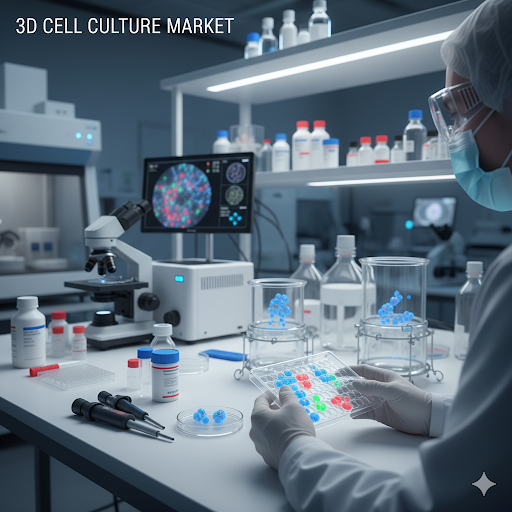3D cell culture, which enables cells to develop in all three dimensions for more viable modeling, is expanding the market via its use in pharmaceutical discovery, regenerative medicine, stem cell research, organoid development, and disease treatment with the backing of substantial investment and its benefits over conventional techniques, as better cell interactions and less animal testing.
Key Growth Drivers and Opportunities
3D Cell Culture Utilization in Drug Discovery: With 3D cell culture, the cells are in an environment that closely resembles their natural one and is more biologically relevant than the 2D methods, thus allowing scientists to create tissue models, investigate cell interaction, and explore drug effects in complicated microenvironments, hence enhancing the accuracy of the drug response in humans and minimizing the failure of drug candidates in preclinical studies.
Challenges
3D cell culture market faces certain limitations such as high prices, technical complexity, absence of standardized protocols and difficulties in scaling up, all of these negatively affecting the acceptance of the market in the spheres of research and use in various industries.
Innovation and Expansion
Advanced Biomed Inc. Declares the Release of A+PerfusCTM, an Integrated Perfusion 3D Cell Culture Platform for Drug Discovery and Precision Medicine
In September 2025, The A+PerfusC system, a small, all-in-one perfusion 3D cell culture incubator intended to mimic human physiological conditions in vitro, was introduced by Advanced Biomed Inc., a biotechnology company dedicated to creating and marketing cutting-edge biomedical products for precision medicine and advanced diagnostics.
The A+PerfusC platform combines environmental management and automated perfusion in a small package that can be put straight onto a microscope for in-the-moment viewing. The device lowers the possibility of contamination and human mistake by supporting up to 12 days of continuous, hands-free cultivation. The platform encourages spheroid and organoid development by preserving consistent nutrition delivery and avoiding waste accumulation, improving cell viability, growth, and the predictability of medication response.
Mitsui Chemicals Introduces InnoCell Cell Culture Microplates, Which Are Extremely Oxygen-Permeable
In June 2025, Mitsui Chemicals, Inc. declared that their InnoCell cell culture microplates, which have superior oxygen permeability, will go on sale in July. By combining Mitsui Chemicals’ distinctive materials with its precision cutting methods, the innovative microplates were produced.
Mitsui Chemicals’ cell culture goods and services are marketed under the InnoCell brand, which was inspired by the company’s objective of accomplishing “innovations in cell culture.” Mitsui compounds are using these advances to harness the potential of its proprietary compounds and offer drug discovery solutions.
Inventive Sparks, Expanding Markets
Amongst other measures, the principal stakeholders are implementing tactics that broadly revolve around the emphasis placed on creative scaffolding innovations in materials, expanding the range of applications for pharmaceuticals and pioneering, setting up collaborations with academic research communities, and pouring resources into state-of-the-art equipment for stimulating market expansion. Following are the names of some firms that are engaged in the area: Thermo Fisher Scientific Inc., Merck KGaA, PromoCell GmbH, Lonza, Corning Incorporated, etc.
About Author:
Prophecy is a specialized market research, analytics, marketing and business strategy, and solutions company that offer strategic and tactical support to clients for making well-informed business decisions and to identify and achieve high value opportunities in the target business area. Also, we help our client to address business challenges and provide best possible solutions to overcome them and transform their business.


